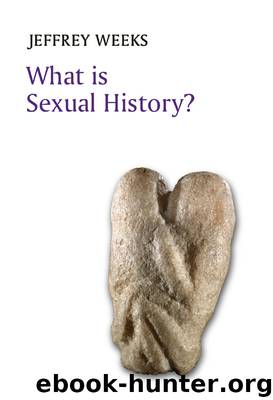What Is Sexual History? by Weeks Jeffrey;

Author:Weeks, Jeffrey;
Language: eng
Format: epub
Publisher: Polity Press
Published: 2016-05-16T04:00:00+00:00
5
Mainstreaming Sexual History
Into the Mainstream
From the 1970s critical sexual history has had a dual aim: first, to speak of crucial aspects of personal and social life that had hitherto been silenced or obscured – identities, subjectivities, bodies, emotions, risks, pleasures and dangers; second, to question and problematize the taken-for-granted, ‘the natural’, and to understand sexuality as a pre-eminently social phenomenon, at the heart of power relations and historical experience. These approaches transformed feminist and lesbian and gay history, though they have had mixed success in reshaping mainstream history. The traditional citadels of historical scholarship opened the door to feminist scholarship in general terms, but proved more resistant to the implications of critical or queer history. At best we see the emergence of an additive history (social history, plus gender, plus sexuality) rather than a transformative history, in which a critical awareness of sexuality changes the lenses through which the past and the present are viewed. David Halperin, perhaps wearily, suggested that a critical sexual history was more likely to enter the mainstream through the queering of literary and cultural studies than directly through more traditional social history, and this is echoed in Laura Doan's plea for a queer critical history as a way of changing the mainstream.1
Mainstreaming involves recognizing the centrality of sexuality to the operation of power in a wide range of historical processes in the modern world. This been a major theme within sexual history since the 1970s. My own initial attempt in 1981 at a survey of British sexual history from 1800, Sex, Politics and Society, was as much a history of changing patterns of family life, gender, domesticity, intimacy and shifting forms of regulation and patterns of agency as one of erotic activity, within the wider context of industrialization, urbanization, imperialism, scientific endeavour, politics, the rise of the welfare state, social movements, and changing religious, moral, legal and medical practices.2 In their pioneering overview of sexual history in the USA, Intimate Matters, D'Emilio and Freedman took a similar stance, stressing that for them the history is a tangle of power relations that constantly reconstructs sexual norms. They offered a narrative that was inclusive about gender, class, race, ethnicity, region and orientation, even though, as they admitted, they were inhibited at this early stage by the limitations of sources, especially in relation to African-American experiences.3
Both these studies critique a linear model of historical progress from repression towards sexual liberation, but each from a perspective of the present suggests a trajectory that foregrounds the growth of individual and collective agency, though always in the context of new potentialities of power, regulation and resistance. Lesley Hall, in her study of gender and sexual change in Britain since 1880, quite rightly emphasizes the often painfully slow rate of change, and the deep continuities – the longue durée – that shape sexual life.4 But it is important also to mark the points of transition, and ruptures, that propel change, and offer the glimpse of new possibilities. Despite the continuities, the sexual
Download
This site does not store any files on its server. We only index and link to content provided by other sites. Please contact the content providers to delete copyright contents if any and email us, we'll remove relevant links or contents immediately.
Come as You Are by Emily Nagoski(4455)
The Evolution of Beauty by Richard O. Prum(2983)
The Clitoral Truth: The Secret World at Your Fingertips by Rebecca Chalker(2708)
The Happy Hooker by Xaviera Hollander(2683)
The Psychology of Human Sexuality by Lehmiller Justin J(2577)
The Book of Questions: Revised and Updated by Gregory Stock Ph.d(2556)
Women on Top by Nancy Friday(2553)
The Modern Alpha Male: Authentic Principles to Become the Man You Were Born to Be: Attract Women, Win Friends, Increase Confidence, Gain Charisma, Master Leadership, and Dominate Life - Dating Advice by Patrick King(2335)
The Ultimate Guide to Anal Sex for Women by Tristan Taormino(2287)
The Coregasm Workout by Debby Herbenick(2260)
She-ology by Sherry A. Ross MD(2155)
101 Nights of Great Sex by Laura Corn(2063)
The Hite Report on Shere Hite by Shere Hite(2057)
The Ultimate Guide to Fellatio by Violet Blue(1937)
The Alchemy of Sexual Energy by Mantak Chia(1848)
A Round-Heeled Woman by Jane Juska(1831)
Orgasm mini book by Susan Bakos(1818)
The Penis Book by Aaron Spitz(1776)
Just Life & Love by A.E. Jones(1742)
